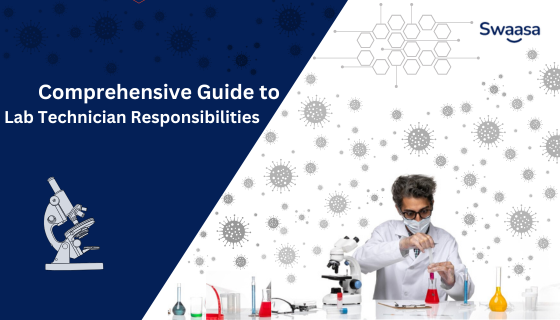
Comprehensive Guide to Lab Technician Responsibilities

22-Oct-2024
Comprehensive Guide to Lab Technician Responsibilities
Introduction
Lab technicians are vital members of the healthcare and scientific communities. They perform essential tasks that ensure the accuracy and efficiency of laboratory operations. This guide delves deep into the responsibilities of lab technicians, outlining their roles, duties, and the skills necessary to excel in this profession. By understanding these responsibilities, aspiring lab technicians and healthcare professionals can appreciate the significance of this crucial role.
Overview of Lab Technician Responsibilities
- Sample Collection: Gathering biological samples such as blood, urine, and tissue.
- Conducting Tests: Performing a variety of laboratory tests to aid in diagnosis.
- Quality Control: Ensuring the reliability of test results through stringent quality measures.
- Data Analysis: Analyzing and interpreting test results for healthcare providers.
- Equipment Maintenance: Maintaining laboratory equipment to ensure optimal performance.
- Safety Compliance: Adhering to safety protocols to prevent accidents and contamination.
Importance of Lab Technicians
Lab technicians contribute significantly to healthcare by providing accurate data that assists in diagnosing and treating medical conditions. Their work directly impacts patient care, making their responsibilities critical in the overall healthcare process.
1. Understanding the Role of a Lab Technician
What is a Lab Technician?
A lab technician is a professional who conducts laboratory tests and procedures under the supervision of laboratory managers or scientists. They are trained to operate laboratory equipment, follow safety protocols, and ensure the accuracy of test results. Their expertise is vital in various settings, including medical laboratories, research facilities, and industrial environments.
Types of Lab Technicians
Lab technicians can specialize in different areas, each with specific responsibilities:
- Medical Lab Technicians: Focus on analyzing clinical specimens to assist in diagnosing diseases.
- Research Lab Technicians: Work in scientific research, conducting experiments and analyzing data.
- Civil Lab Technicians: Test construction materials and ensure compliance with safety regulations.
- Computer Lab Technicians: Manage IT resources and provide technical support in educational settings.
2. Key Responsibilities of Lab Technicians
A. Sample Collection and Preparation
Sample Collection: One of the fundamental responsibilities of a lab technician is to collect samples from patients. This may include:
- Blood Samples: Obtained via venipuncture or fingerstick, requiring knowledge of proper techniques to minimize discomfort and ensure sample integrity.
- Urine Samples: Collected using specific containers and protocols to avoid contamination.
- Tissue Samples: Involves biopsy procedures where technicians assist in obtaining tissue for analysis.
- Sample Preparation: After collection, samples need to be prepared for analysis, which includes:
- Labeling: Ensuring samples are correctly labeled with patient information to avoid mix-ups.
- Processing: Preparing samples through methods like centrifugation, where blood samples are spun to separate components.
- Storing: Maintaining samples under appropriate conditions to preserve their integrity until testing.
B. Conducting Laboratory Tests
Lab technicians perform a wide range of tests, which can be categorized into:
- Routine Tests: Such as complete blood counts (CBC), urinalysis, and metabolic panels.
- Specialized Tests: Including cultures for pathogens, genetic testing, and hormone assays.
- Testing Procedures: Technicians must follow specific protocols to ensure accuracy:
- Equipment Calibration: Regularly calibrating machines like analyzers to maintain precision.
- Reagent Preparation: Preparing chemical solutions needed for specific tests.
- Procedure Adherence: Following established procedures to ensure reliable results.
C. Quality Control
Quality control is crucial in laboratory settings. Lab technicians must implement and monitor quality assurance measures, which include:
- Calibration Checks: Regular checks of laboratory equipment to ensure accurate measurements.
- Control Samples: Running known samples alongside patient samples to validate results.
- Documentation: Maintaining records of quality control activities to track performance and compliance.
D. Data Analysis and Reporting
Once tests are completed, lab technicians analyze and interpret the data. This involves:
- Result Compilation: Gathering data from various tests to create a comprehensive report.
- Statistical Analysis: Utilizing statistical methods to ensure the reliability of results.
- Reporting Findings: Communicating results clearly to healthcare providers, including any anomalies or concerns.
E. Equipment Maintenance
Lab technicians are responsible for the upkeep of laboratory equipment. Their duties include:
- Routine Maintenance: Cleaning and servicing equipment to prevent malfunctions.
- Troubleshooting: Identifying issues with equipment and addressing them promptly.
- Inventory Management: Keeping track of supplies and ordering replacements as needed.
F. Adherence to Safety Protocols
Safety is a top priority in laboratory environments. Lab technicians must:
- Follow Safety Guidelines: Adhering to protocols for handling hazardous materials and biological samples.
- Waste Disposal: Ensuring proper disposal of biological and chemical waste to prevent contamination.
- Emergency Preparedness: Participating in safety drills and being familiar with emergency procedures.
3. Specialized Lab Technician Roles
A. Medical Lab Technician Responsibilities
Medical lab technicians focus on analyzing clinical specimens. Their responsibilities include:
- Conducting Advanced Tests: Performing tests like blood typing, cross-matching, and microbiological cultures.
- Collaboration with Physicians: Working closely with doctors to interpret test results and provide recommendations for further testing.
B. Cath Lab Technician Roles
Cath lab technicians specialize in assisting with cardiovascular procedures. Their duties include:
- Patient Preparation: Preparing patients for catheterization procedures, including educating them about the process.
- Assisting in Procedures: Supporting physicians during angiograms, stent placements, and other interventions.
C. Civil Lab Technician Responsibilities
Civil lab technicians work within the construction and engineering sectors. Their responsibilities include:
- Material Testing: Testing soil, concrete, and asphalt for quality and compliance with regulations.
- Field Inspections: Conducting inspections at construction sites to ensure adherence to safety standards.
D. Computer Lab Technician Responsibilities
Computer lab technicians manage IT-related tasks in educational and research settings. Their responsibilities include:
- Technical Support: Providing assistance to users regarding software and hardware issues.
- Resource Management: Ensuring that computers and other equipment are operational and up to date.
5. Educational Requirements and Career Path
A. Educational Qualifications
To become a lab technician, individuals typically need:
- Degree/Diploma: A relevant degree or diploma in medical laboratory technology or a related field.
- Certification: Obtaining certification from recognized bodies can enhance job prospects.
B. Career Advancement
Lab technicians have opportunities for career advancement, including:
- Specialization: Pursuing further education in specialized areas such as histotechnology or cytotechnology.
- Leadership Roles: Moving into supervisory or managerial positions within the laboratory.
6. Challenges Faced by Lab Technicians
Lab technicians encounter various challenges in their roles, such as:
- High Workload: Managing multiple tests and samples can lead to time constraints.
- Emotional Strain: Dealing with critical samples and results can be emotionally taxing.
- Technological Changes: Keeping up with advancements in laboratory technology requires continuous learning.
7. Comparison of Lab Technician Roles
Medical Lab Technician
Role: Conduct tests, analyze specimens, collaborate with doctors.
Responsibilities:
- Perform laboratory tests and analyze results.
- Maintain lab equipment and ensure safety protocols.
- Work with healthcare professionals to interpret findings.
Required Skills:
- Attention to detail.
- Strong analytical skills.
Cath Lab Technician
- Role: Assist in cardiovascular procedures, prepare patients.
Responsibilities:
- Prepare and maintain equipment for procedures.
- Monitor patients during procedures.
- Collaborate with cardiologists and other healthcare staff.
Required Skills:
- Technical skills in medical equipment.
- Strong patient communication skills.
Civil Lab Technician
Role: Test materials, conduct field inspections.
Responsibilities:
- Analyze construction materials and soil samples.
- Conduct field tests and inspections for compliance.
- Prepare reports on findings.
Required Skills:
- Problem-solving abilities.
- Knowledge of construction materials and practices.
Computer Lab Technician
Role: Manage IT resources, provide technical support.
Responsibilities:
- Maintain computer hardware and software.
- Assist users with technical issues.
- Ensure proper functioning of lab equipment.
Required Skills:
- Technical expertise in IT systems.
- Strong user support skills.
Conclusion
Lab technicians play a crucial role in the healthcare and scientific communities, ensuring accurate testing and analysis that directly impacts patient care. Their responsibilities encompass a wide range of tasks, from sample collection to data analysis, requiring a unique set of skills and knowledge. Understanding the depth of their responsibilities can help aspiring lab technicians appreciate the importance of their role in the healthcare ecosystem.
FAQs about Lab Technician Responsibilities
1Q: What are the main responsibilities of a Lab Technician?
Ans: Lab technicians are responsible for sample collection, conducting tests, quality control, data analysis, equipment maintenance, and ensuring safety protocols are followed.
2Q: What skills are important for a lab technician?
Ans: Key skills include attention to detail, technical proficiency, communication abilities, and problem-solving skills.
3Q: What is the difference between a medical lab technician and a civil lab technician?
Ans: Medical lab technicians focus on clinical testing and patient samples, while civil lab technicians work with construction materials and quality assurance.
4Q: How can I become a lab technician?
Ans: To become a lab technician, one typically needs a relevant degree or diploma in medical laboratory technology or a related field, along with hands-on training.
5Q: Are there specialized lab technician roles?
Ans: Yes, lab technicians can specialize in various fields such as medical labs, cath labs, civil engineering, or IT support in computer labs.

AUTHOR

Related Jobs


